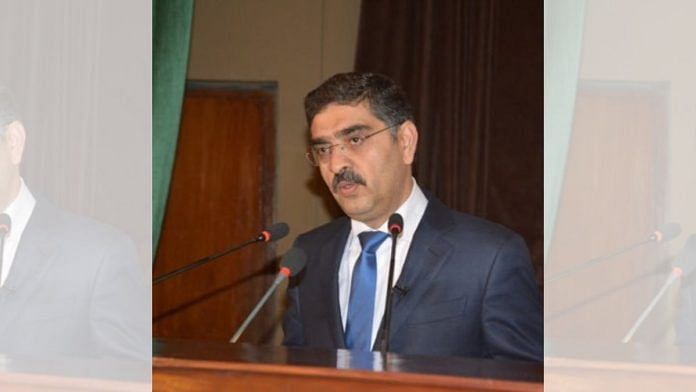New Delhi: Senator Anwaar-ul Haq Kakar from the Balochistan Awami Party (BAP) has been chosen as the interim Prime Minister of Pakistan. He will head the government till a new government is sworn-in after the general election scheduled for November.
Pakistan Prime Minister’s Office Saturday issued a statement announcing his selection. Outgoing Prime Minister Shehbaz Sharif and Opposition Leader in the National Assembly (NA) Raja Riaz reached a consensus over Kakar’s name for the coveted post during a meeting in Islamabad today.
“We had earlier decided that the caretaker PM should be someone from a smaller province and a non-controversial personality. Our aim was to remove the sense of deprivation in small provinces.
“We have finally reached a consensus that Anwaar-ul Haq Kakar will be the caretaker PM,” Riaz was quoted as saying by Dawn newspaper.
President Arif Alvi approved the appointment of Senator Anwaar-ul Haq Kakar as the caretaker prime minister under Article 224(1A) of the Constitution.
صدر مملکت ڈاکٹر عارف علوی نے انوار الحق کاکڑ کی بطور نگران وزیراعظم تعیناتی کی منظوری دے دی
صدر مملکت نے تعیناتی کی منظوری آئین کے آرٹیکل 224 ایک اے کے تحت کی pic.twitter.com/U8mGQXLZva
— The President of Pakistan (@PresOfPakistan) August 12, 2023
It was late Wednesday that the National Assembly was dissolved on the advice of outgoing prime minister Shehbaz Sharif.
A caretaker government now takes over for 90 days (it would have been 60 days had the assembly been dissolved on schedule).
A caretaker prime minister is the acting head of government, appointed to ensure that free and fair elections are held in the country.
The caretaker government under Kakar is unique in that it will have powers beyond governance alone.
Last month, the National Assembly granted the caretaker government power to take decisions on “existing bilateral, multilateral and ongoing projects”.
This decision ensures that the caretaker government can sign agreements on loans and investments with international financial institutions such as the World Bank and the International Monetary Fund (IMF).
Also Read: Parliamentary panel urges MEA to ‘better utilise Indian missions’ to meet foreign policy objectives
Who is Anwaar-ul Haq Kakar?
A teacher-turned-politician from Balochistan, Kakar was elected as an independent senator in 2018.
After assuming office, he co-launched a new political party named Balochistan Awami Party (BAP).
He has served as the chairperson of the Senate Standing Committee on Overseas Pakistanis and Human Resource Development and was also a member of the Business Advisory Committee, Finance and Revenue, Foreign Affairs and Science and Technology.
He was also the spokesperson of the Balochistan provincial government.
He is said to be from the Kakar tribe of Pashtun ethnicity, so he represents both Pashtuns and Balochs.
The News reported that he received his primary education from St. Francis School, Quetta, and later enrolled in Cadet College Kohat but returned to the Balochistan provincial capital after his father’s demise.
The senator has done a Master’s in political science and sociology from University of Balochistan and started his career by teaching in a school in his native town, it reported.
What is a caretaker government?
A caretaker government is a temporary administration in charge of overseeing day-to-day affairs and ensuring smooth transition of power through free and fair elections. In the case of Pakistan, with a limited term of 60 to 90 days, this administration is responsible for maintaining law and order and continuing governance in the country.
Numerous democratic countries have appointed interim governments before their elections, such as the UK, Bulgaria, Israel and Italy.
In Pakistan, caretaker governments were introduced to the 1973 Constitution by General Zia-ul-Haq in 1985 under the Revival of Constitution of 1973 Order (RCO). Previously, the Constitution stated that while the National Assembly is dissolved, heads of the government such as the prime minister, and the cabinet, would continue to hold office until the new government is elected.
In light of the amendment, once the President or governor dissolves the National Assembly, a caretaker cabinet has to be appointed until a new prime minister is elected. This structure was established to prevent election rigging.
This amendment was further strengthened in 2010 through the 18th Amendment of the Constitution, which stated that the interim prime minister shall be selected by the president or governor in consultation with the outgoing PM and the leader of the opposition in the National Assembly. It also stated that family members of the caretaker PM will be ineligible to contest in the upcoming elections.
A 2012 amendment removed the authority of the president or governor in the selection process and established that, in case the PM and opposition leader cannot reach a consensus, the speaker of the assembly and then the Election Commission of Pakistan will choose the interim PM out of two given nominees.
(Edited by Smriti Sinha)
Also Read: How Niger coup could unleash political & economic proxy wars in Africa’s crucial Sahel region



